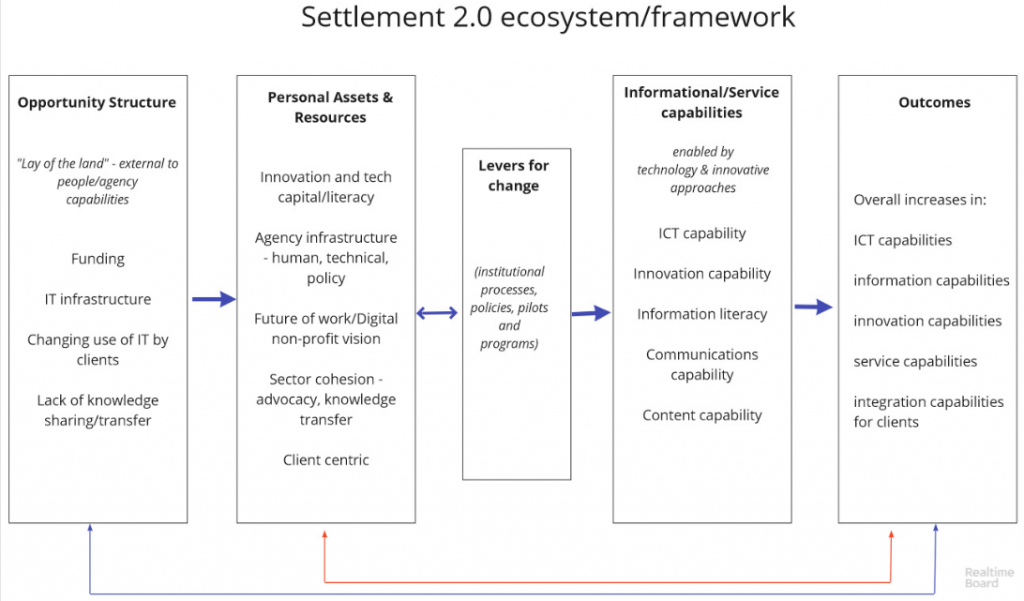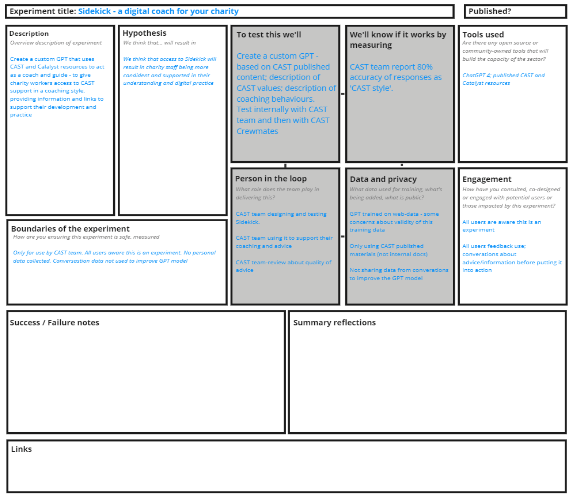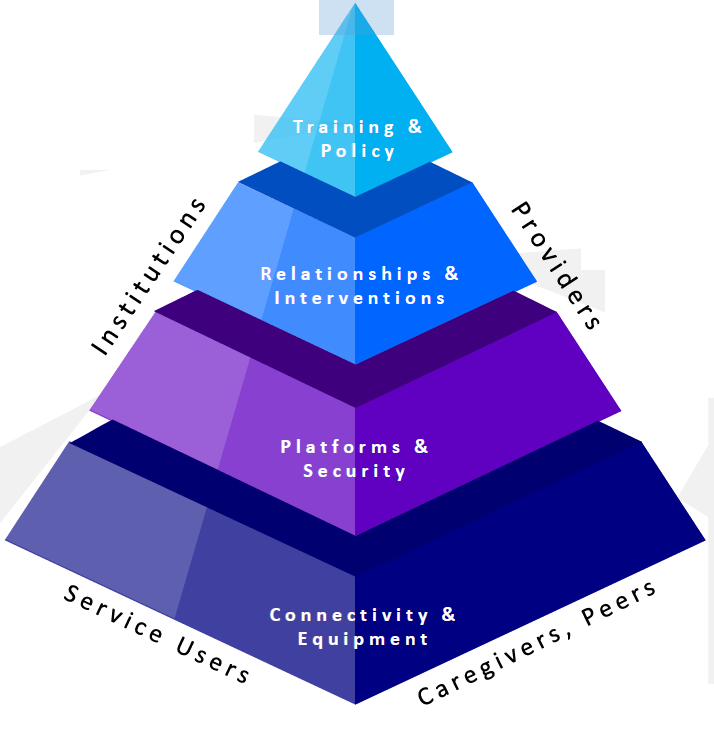We won’t have time to share everything I would love to share that I think is important and useful for our work. Here are links to additional resources I outlined in the session. Each section has a brief set of bullets to let you know the focus and then links to resources where you can dive in and learn more.
Here are my final presentation slides:
Settlement Sector Core Values & Best Practice Guidelines
From Canadian Council for Refugees – Canadian National Settlement Service Standards Framework (2000)
- Access
- Inclusion
- Client empowerment
- User-defined services
- Holistic approach
- Respect for the individual
- Cultural sensitivity
- Community development
- Collaboration
- Accountability
- Orientation towards positive change
- Reliability
Building a Newcomer-Centric Technology-Enabled Settlement Sector in Canada

Tech adoption and client centricity in non-profit organizations
- Understanding client needs and preferences for digital communication
- Balancing in-person and digital service delivery
- Ensuring accessibility and inclusion in digital services
- General technology – understanding Newcomer use of technology
- the importance of involving clients in service design to ensure technology is used effectively.
Assessing Your Clients’ Digital Access, Literacy and Comfort – Questions You Can Use
Research on Newcomer information practice
The seamless digital settlement experience

Using AI technology to improve service delivery in a non-profit organization – Practical implementation – how to choose, use, and evaluate
- Leveraging AI in employment services, with a focus on practical applications and governance
- Using AI tools for staff training in social services
- Using technology to improve service delivery for newcomers, including AI and digital literacy
- Using AI in employment counselling, with examples of success and potential challenges
- Using AI in employment services, with a focus on local experiences and practical applications
Articles, research, good ideas in AI use in the sector
AI Suitability Framework for Nonprofits
32 questions for nonprofits to answer when considering whether and how to incorporate AI into their work.
AI Governance Framework for Nonprofits
Sponsored by Microsoft, created by Afua Bruce, author of The Tech that Comes Next.
AI Experiment Canvas
A simple canvas to think through any use of GenAI.
Dataiku’s Defining a Successful AI Project
Dozens of potential AI use cases but limited resources. How can you prioritize the right projects? Start here.

Digital transformation in the sector
- Hands-on examples of how to use various digital tools in daily work
- Focus on tools that don’t require additional budget
- Case studies of successful technology integration in settlement and employment services
- DMSI and digital messaging – Refugee 613, COSTI
- AI – Acces Employment
- CRM –
- Apps – PeaceGeeks, TNLIP
- Service portals –
- General approaches – Josoor
- AI – mock interviews (Refugee Jumpstart), etc., employment (Kibbi)
Digital Service Delivery and Digital Transformation
Good Digital Ideas & Promising Digital Practices in Settlement & Inclusion
Explore Refugee 613’s toolkit for best practices in digital messaging.
Leverage WhatsApp Business features for efficient client communication and service delivery.
Utilize WhatsApp Communities to manage and build organizational groups effectively.

Good Ideas in Settlement & Inclusion
Addressing different skill levels:
- Catering to both tech-savvy staff and those intimidated by technology
- Helping experienced staff adapt to new technologies
- Supporting newer staff in applying their tech skills to professional settings
- Get past intimidation for those who don’t feel tech savvy
Digital Navigators and Digital Champions

Digital service delivery – leveraging existing tools such as digital messaging, LinkedIn, service portals, CRMs, where automation can fit, etc.
- Introduction to various tools and their potential applications
- Time-saving technologies for administrative tasks
Shared Digital Guides from the UK
Frontline Tech for Settlement Practitioners
Look at technology governance in general, as well as with AI
- Privacy and security considerations
- Setting boundaries for digital communication with clients
- Overcoming resistance to technology adoption
- emphasizing the relevance of sector values in today’s digital setting, and the need to make services accessible to all who need them
Articles, research, and good ideas on technology governance
Primers on privacy, security, encryption, and online confidentiality
Government of Canada guide on the use of generative artificial intelligence

Tech tools and how to deploy them in their orgs – Organizational considerations
- How to pitch technology ideas to management
- Governance and policy considerations for technology use
- Balancing excitement for new tools with organizational readiness
Practical tools to help move the conversation forward in your organization:
NetHope Digital Nonprofit Ability Assessment
Use this assessment to make decisions about how to begin your digital transformation journey.
Nonprofit Service Canvas
A tool to help you create a quick proposal for a new service idea.
Future Focused
- Ongoing digital transformation in the sector means lifelong learning
- Skills development for evolving technological landscape
Start with LinkedIn Learning which you can access for free via your local library system.
Sector-specific and related technology webinars and learning opportunities

Bridging Digital inclusion – Josoor conference – presentation about the now and future of our work
By the end of 2024, you should:
- be confident in your digital skills and know how to access additional support.
- be aware of user centred service design and know how to access and be supported in identifying opportunities for innovation
- be aware of the importance of data and intelligence and be able to access the information you need to measure performance, predict and anticipate future demand and make well-informed decisions. This might sound the most intimidating, but it really means developing deep knowledge of clients and communities, which is factored in service and program design and delivery. “To ensure we design and deliver the right digital and technology services, we will design our services around the needs of the people using them and put digital at the heart.”
- receive data protection and cyber security training
- embrace your role as a Digital Navigator, know where to access digital literacy information for your clients and share what you create with the sector

Policies, Protocols, Guidelines
Download a repository of useful policies, protocols, and guidelines (this repository was last updated in February 2022 but contains useful documents nonetheless).
Documents in this repository include:
YMCA-YWCA of the National Capital Region
- Sample newcomer services privacy & security guidelines
- Smart phone ACCEPTABLE USE guidelines – draft sample guidelines
- Safety Privacy Guideline for clients – mobile apps for service
North York Community House (policies include technology but also other relevant policies your organization should have in place)
- NYCH technology and electronic media protocols 2018
- Information Technology and Electronic Media 2017
- Code of Conduct 2017
- Confidentiality and Intellectual Property 2017
- NYCH-Accessibility+&+Accessible+Client+Service+Plan
- Internal Complaints 2017
- NYCH-External+Complaints
- NYCH+External+Complaint+Form
- Onboarding, Training and Development 2017
- Risk+Management+2017
- Workplace Anti-Harassment & Anti-Discrimination 2017
- Anti-Oppression 2017
- Health and Safety 2017
Niagara Folk Arts Multicultural Centre (NFAMC)
- NFAMC anti-racism policy
- NFAMC conduct and discipline progressive discipline policy
- NFAMC Human Rights and Anti Harassment Policy
- NFAMC Work from Home Policy
- NFAMC Guidelines for the use of NFAMC equipment at home
- NFAMC Workplace Violence Policy
- NFAMC Working from Home Agreement
- NFAMC Working from Home Checklist
- NFAMC workplace violence employees incident report
The repository also includes interesting related recent research documents as well as practice standards documents from Social Work and Information & Referral.
